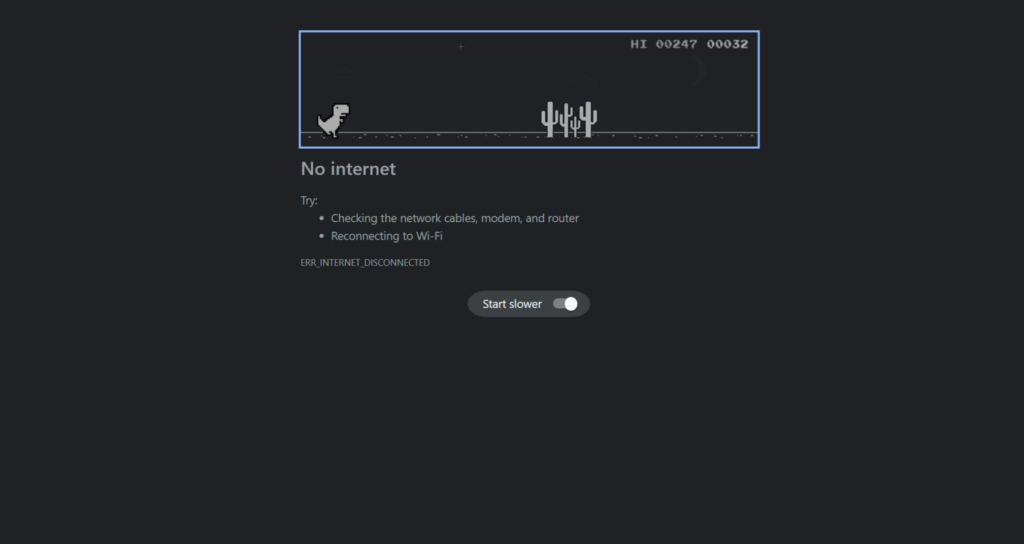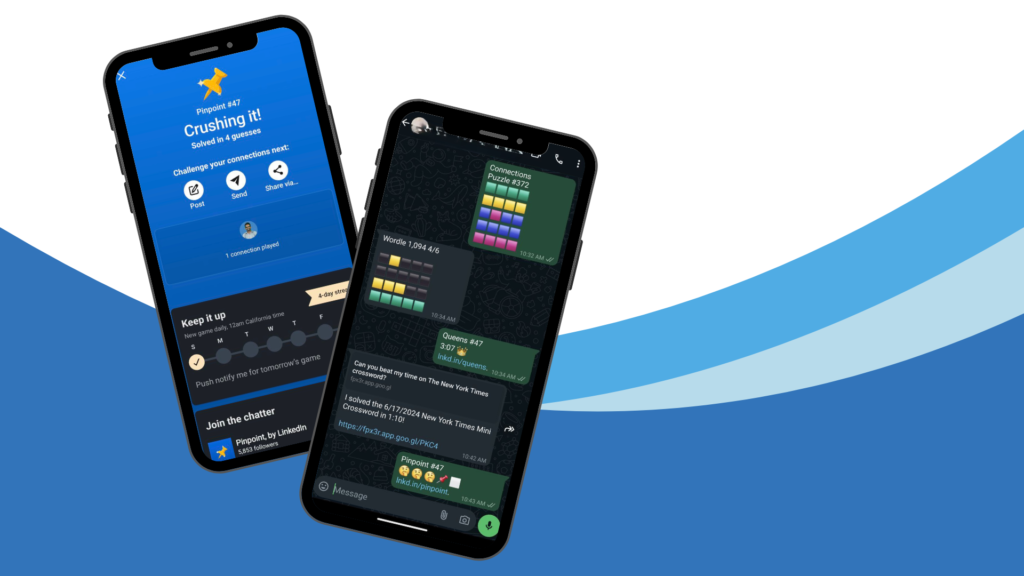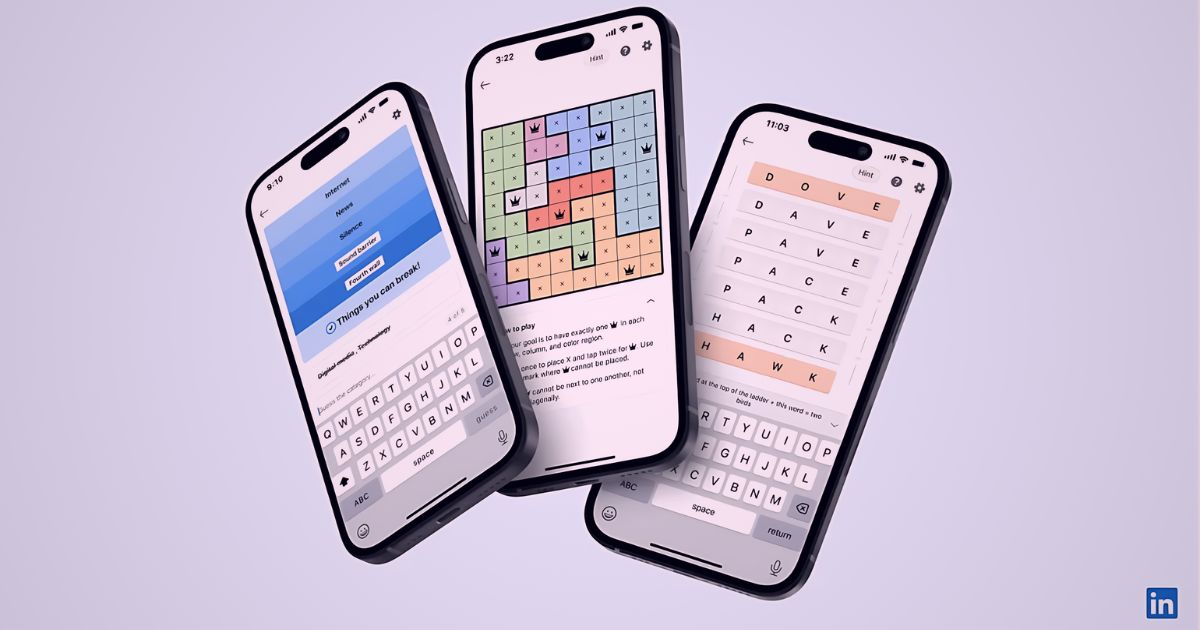Imagine my surprise when I opened the LinkedIn app one fine day to a prompt asking whether I wanted to play games on it. Games. After double-checking the date (no it was not April 1st) and the app (still LinkedIn), with a great deal of trepidation I clicked on the notification to see what this was about. Turns out, I was late to the party.
Since 1 May, LinkedIn has had three mini-games in its repertoire. Pinpoint, a guess-the-category game; Queens, a cross between sudoku and chess; and Crossclimb, a twist on the common puzzle format.
Like the vastly popular NYTimes Games, the new LinkedIn games can be played once a day, and results can be shared with your connections – both on the platform and off.
Is LinkedIn losing track of its purpose?
At first glance, you – and a large part of the internet – would say yes, and LinkedIn certainly hasn’t helped its reputation, with “building new connections” being interpreted more and more liberally every day. Some of us still have lingering trauma over it being used as a dating site.
Games on LinkedIn sound very counterintuitive, but the team is convinced this is the right decision. “Connect over fun, daily games,” is the cheery accompanying message. “Keep your mind sharp and compare scores with others.” And to its credit, the platform does make the networking aspect remarkably easy, even showing you which of your connections is indulging in the same puzzles. LinkedIn hopes that this will foster new discussions, connections, and competitiveness.
On the flip side, others argue that you should not be playing these games. “Do you really want to invite hiring managers and C-suite executives to play a silly little game with you? Not just once, but every single day without fail? The correct answer is no,” one article points out. Another argument is that we shouldn’t be flaunting – on LinkedIn – that we’re spending our time playing games.
Personally, LinkedIn games have been a hit, because I now find myself heading to LinkedIn once a day as opposed to once in a blue moon. And if someone wants to begrudge me my grand total of 10 minutes daily playing interesting games, it’s likely not someone I would want to work with, anyway.
Games are nothing new
Gamification has been part and parcel of the internet for a while now, and various social media platforms have attempted to jump on this bandwagon through the years, with varying levels of success.
Facebook, the boomer of social media, had a more traditional approach to games on its platform, but one which succeeded nonetheless. At one point, dodging Candy Crush requests was akin to dodging GOT spoilers – almost impossible. In 2022, new sensation TikTok tried its luck by adding mini-games as well; this did not garner lasting success. Last year, YouTube also tried adding playables as a beta feature for its premium subscribers. Judging from its current absence, we can assume that was also short-lived. Even Instagram’s DMs can be turned into a ping-pong game of emojis.

Aside from social media platforms, browsers and search engines also have integrated games we often forget about (Google’s Atari Breakout and the No Internet Game are classics). Even service providers like Netflix took their shots, which also failed.
Even gamelets such as Wordle has been tried and tested – give Hulu’s Cinematrix a shot! – but even those have largely failed to garner consistent engagement on a large enough scale.
Over on the professional and networking aspect of things, two very different platforms – Microsoft Teams and Discord – boast games that can be played on group calls to foster connections.
However, the new(ish) LinkedIn games are the first time we’ve seen daily gamelets integrated into a platform that’s meant to be purely professional. It’s also the first time we’ve seen a platform utilize the social media aspect of mini-games to a level previously only achieved by the NYTimes.

By easy-to-hit share buttons, and a text version detailing your triumphs even on slow connections or button phones, these new mini-games utilize social media to keep the competition going. After all, we all want to show how we’re the best at something, right?
Brace yourself, in a few months we’ll get the cringe LinkedIn motivational posts about losing the games three days in a row and how to get yourself back up.
The winning formula; the new ‘stories’?
When Instagram first introduced stories, it sparked a social media revolution, and nowadays you can find stories on almost any and every app (although platforms like X and LinkedIn chalked up fail on that too). A similar situation occurred when TikTok took off, with other platforms quickly hopping on the bandwagon with reels, or shorts, or whatever you want to call it (rumor once again has it that LinkedIn is testing this out too).
Will social media gamelets become the next big thing? It certainly has the potential for it – it’s easily shareable, takes only a few minutes daily, gives your brain some exercise followed by a feeling of accomplishment, and does, in fact, help us forge new connections. Will this pan out, or will it be another short-lived attempt? We can only wait and see.







GIPHY App Key not set. Please check settings